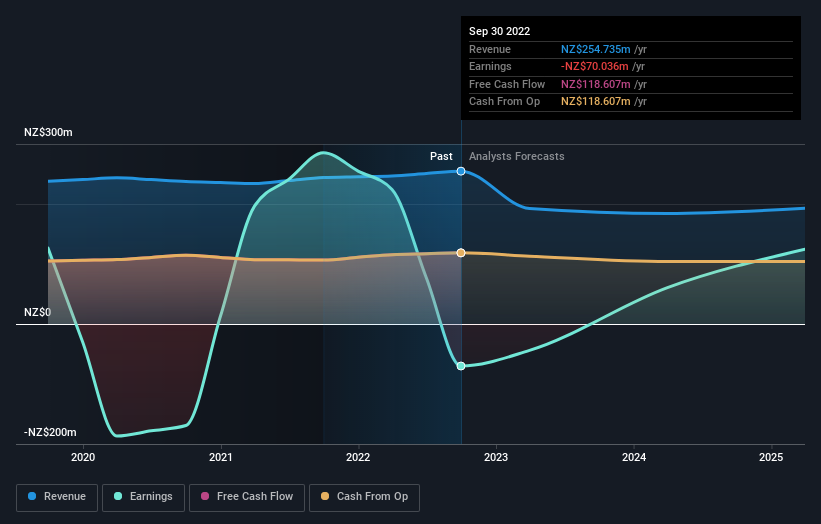- New Zealand
- /
- Retail REITs
- /
- NZSE:KPG
individual investors who own 52% along with institutions invested in Kiwi Property Group Limited (NZSE:KPG) saw increase in their holdings value last week

Every investor in Kiwi Property Group Limited (NZSE:KPG) should be aware of the most powerful shareholder groups. The group holding the most number of shares in the company, around 52% to be precise, is individual investors. Put another way, the group faces the maximum upside potential (or downside risk).
While individual investors were the group that benefitted the most from last week’s NZ$110m market cap gain, institutions too had a 48% share in those profits.
In the chart below, we zoom in on the different ownership groups of Kiwi Property Group.
Check out our latest analysis for Kiwi Property Group

What Does The Institutional Ownership Tell Us About Kiwi Property Group?
Many institutions measure their performance against an index that approximates the local market. So they usually pay more attention to companies that are included in major indices.
We can see that Kiwi Property Group does have institutional investors; and they hold a good portion of the company's stock. This implies the analysts working for those institutions have looked at the stock and they like it. But just like anyone else, they could be wrong. It is not uncommon to see a big share price drop if two large institutional investors try to sell out of a stock at the same time. So it is worth checking the past earnings trajectory of Kiwi Property Group, (below). Of course, keep in mind that there are other factors to consider, too.

Hedge funds don't have many shares in Kiwi Property Group. Accident Compensation Corporation, Asset Management Arm is currently the largest shareholder, with 9.4% of shares outstanding. With 8.5% and 5.3% of the shares outstanding respectively, ANZ New Zealand Investments Limited and BlackRock, Inc. are the second and third largest shareholders.
On studying our ownership data, we found that 25 of the top shareholders collectively own less than 50% of the share register, implying that no single individual has a majority interest.
Researching institutional ownership is a good way to gauge and filter a stock's expected performance. The same can be achieved by studying analyst sentiments. There are a reasonable number of analysts covering the stock, so it might be useful to find out their aggregate view on the future.
Insider Ownership Of Kiwi Property Group
The definition of an insider can differ slightly between different countries, but members of the board of directors always count. Company management run the business, but the CEO will answer to the board, even if he or she is a member of it.
Insider ownership is positive when it signals leadership are thinking like the true owners of the company. However, high insider ownership can also give immense power to a small group within the company. This can be negative in some circumstances.
Our information suggests that Kiwi Property Group Limited insiders own under 1% of the company. It appears that the board holds about NZ$1.7m worth of stock. This compares to a market capitalization of NZ$1.5b. Many investors in smaller companies prefer to see the board more heavily invested. You can click here to see if those insiders have been buying or selling.
General Public Ownership
The general public, who are usually individual investors, hold a substantial 52% stake in Kiwi Property Group, suggesting it is a fairly popular stock. This size of ownership gives investors from the general public some collective power. They can and probably do influence decisions on executive compensation, dividend policies and proposed business acquisitions.
Next Steps:
I find it very interesting to look at who exactly owns a company. But to truly gain insight, we need to consider other information, too. Consider for instance, the ever-present spectre of investment risk. We've identified 2 warning signs with Kiwi Property Group (at least 1 which doesn't sit too well with us) , and understanding them should be part of your investment process.
If you would prefer discover what analysts are predicting in terms of future growth, do not miss this free report on analyst forecasts.
NB: Figures in this article are calculated using data from the last twelve months, which refer to the 12-month period ending on the last date of the month the financial statement is dated. This may not be consistent with full year annual report figures.
Valuation is complex, but we're here to simplify it.
Discover if Kiwi Property Group might be undervalued or overvalued with our detailed analysis, featuring fair value estimates, potential risks, dividends, insider trades, and its financial condition.
Access Free AnalysisHave feedback on this article? Concerned about the content? Get in touch with us directly. Alternatively, email editorial-team (at) simplywallst.com.
This article by Simply Wall St is general in nature. We provide commentary based on historical data and analyst forecasts only using an unbiased methodology and our articles are not intended to be financial advice. It does not constitute a recommendation to buy or sell any stock, and does not take account of your objectives, or your financial situation. We aim to bring you long-term focused analysis driven by fundamental data. Note that our analysis may not factor in the latest price-sensitive company announcements or qualitative material. Simply Wall St has no position in any stocks mentioned.
About NZSE:KPG
Kiwi Property Group
Kiwi Property (NZX: KPG) is one of the largest listed property companies on the New Zealand Stock Exchange and is a member of the S&P/NZX 20 Index.
Good value second-rate dividend payer.
Market Insights
Community Narratives



